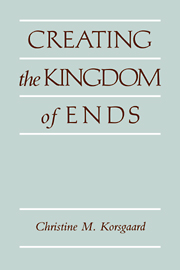Book contents
- Frontmatter
- Contents
- Introduction
- Abbreviations for Kant's works
- PART ONE KANT'S MORAL PHILOSOPHY
- 1 An introduction to the ethical, political, and religious thought of Kant
- 2 Kant's analysis of obligation: The argument of Groundwork I
- 3 Kant's Formula of Universal Law
- 4 Kant's Formula of Humanity
- 5 The right to lie: Kant on dealing with evil
- 6 Morality as freedom
- 7 Creating the Kingdom of Ends: Reciprocity and responsibility in personal relations
- PART TWO COMPARATIVE ESSAYS
- Bibliography
- Sources
- Other publications by the author
- Index
- Index of citations
7 - Creating the Kingdom of Ends: Reciprocity and responsibility in personal relations
Published online by Cambridge University Press: 05 June 2012
- Frontmatter
- Contents
- Introduction
- Abbreviations for Kant's works
- PART ONE KANT'S MORAL PHILOSOPHY
- 1 An introduction to the ethical, political, and religious thought of Kant
- 2 Kant's analysis of obligation: The argument of Groundwork I
- 3 Kant's Formula of Universal Law
- 4 Kant's Formula of Humanity
- 5 The right to lie: Kant on dealing with evil
- 6 Morality as freedom
- 7 Creating the Kingdom of Ends: Reciprocity and responsibility in personal relations
- PART TWO COMPARATIVE ESSAYS
- Bibliography
- Sources
- Other publications by the author
- Index
- Index of citations
Summary
As the virtuous man is to himself, he is to his friend also, for his friend is another self.
AristotleWhen we hold a person responsible, we regard her as answerable for her actions, reactions, and attitudes. We use the concept of responsibility in two contexts, the legal and the personal. We use it in the legal context when we must determine whether to punish someone for a crime or make him liable for another's losses. We use it in the context of everyday personal interaction, when we are pressed to decide what attitude we will take toward another, or toward some action or reaction of another. It is frequently assumed that these two uses are the same or at least continuous. Because I have doubts about this, and some worries about the appropriateness of using the notion in the legal context, I want to lay that use aside. In this paper, my focus will be on our practice of holding people responsible in the context of personal relations.
I begin by offering an account of personal relations, derived from Kant and Aristotle, along with an explanation of why they require us to hold one another responsible. I then distinguish two views about what holding someone responsible involves. Specifically, I argue that to hold someone responsible is to adopt an attitude towards him rather than to have a belief about him or about the conditions under which he acts.
- Type
- Chapter
- Information
- Creating the Kingdom of Ends , pp. 188 - 222Publisher: Cambridge University PressPrint publication year: 1996
- 27
- Cited by



